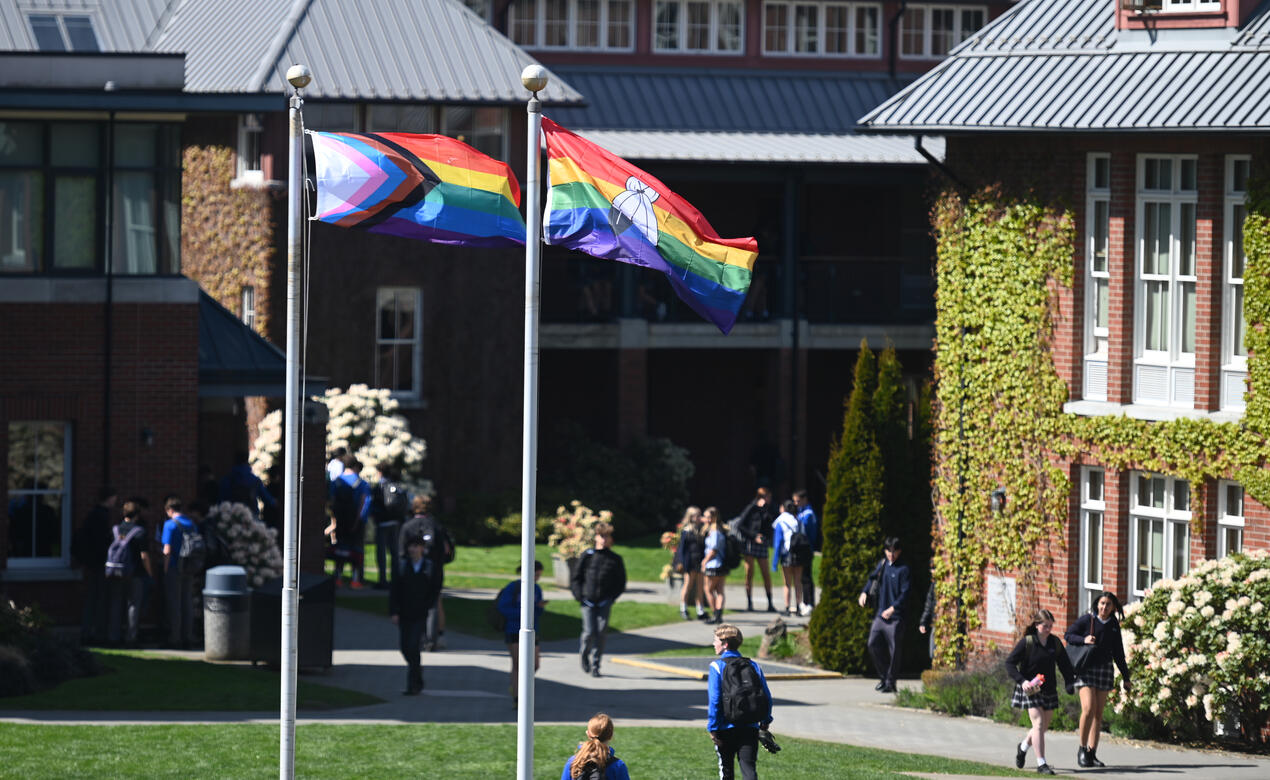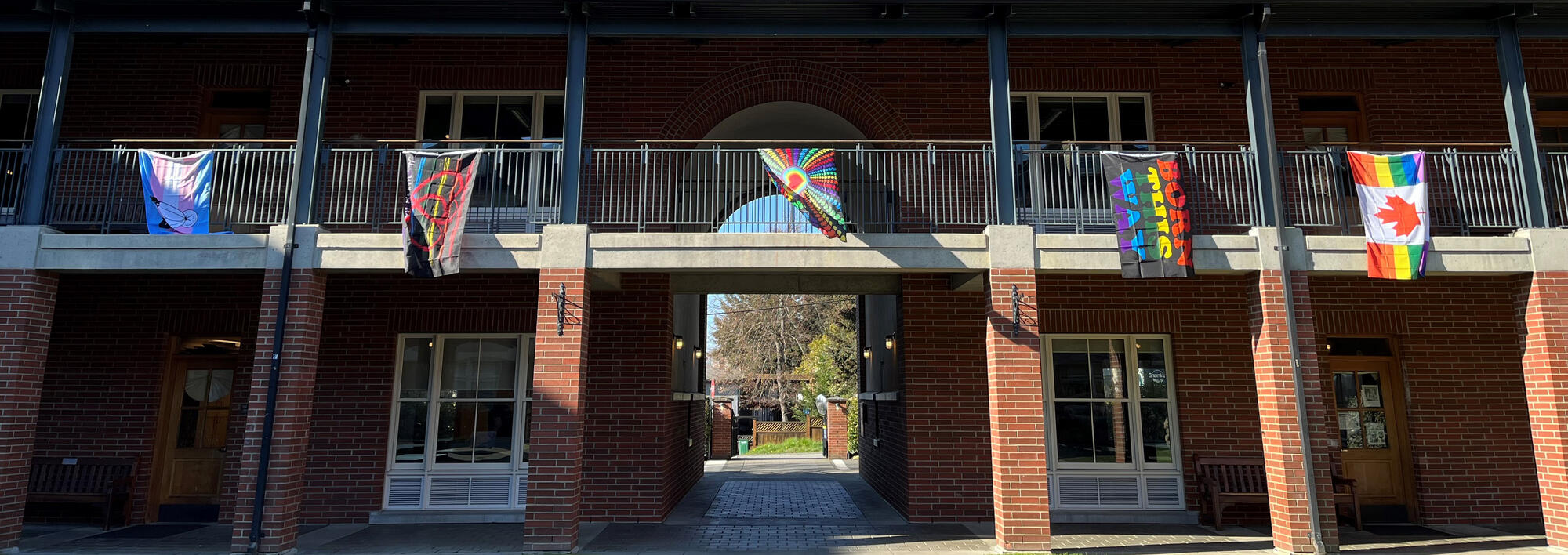
As someone who tries to be a good ally for our 2SLGBTQI+ students, I’m always excited when SMUS’s Pride Week rolls around. It’s a time when our Pride Club members get to step forward into the spotlight and share their truths. Inevitably, they change hearts and minds. And that’s what Pride Week is all about: education, outreach and optimism.
These days, it feels like we could all use more positivity in our lives. Whether it’s the continuing legacy of the pandemic, the proliferation of war, growing inequality, the newness of artificial intelligence, or the threat of climate change (or all of the above) many of us adults are left feeling uncertain about the future...
So too, I suspect, are our students. Especially our 2SLGBTQI+ ones.
On the one hand, they’re living in a moment where – locally at least – they enjoy unprecedented rights and protections…at least compared to those who came before. That much was clear to me, this week, as I worked to produce a timeline of 2SLGBTQI+ history.
It was amazing to be reminded that:
- it was only thirty years ago that the Supreme Court of Canada finally prohibited discrimination on the basis of sexual orientation,
- or that it was only twenty-two years ago that Marc Hall, a brave high schooler in Ontario, had to sue his public school board to allow him to take his boyfriend to the prom,
- or that it was only eight years ago — eight years after SMUS’s Pride Club was first founded — that a rainbow flag finally flew for the first time over Parliament Hill.
Clearly, we’ve come so far — even just in the last seventeen years that I’ve taught at SMUS.
And yet, amid growing political polarization, social-media-driven misinformation, and populists pandering to our worst human impulses, I find it hard not to worry about all our students — especially our trans ones.
I can’t imagine what it must be like to have one’s very existence publicly debated, dismissed or legally restricted. Or how demoralizing it must be to hear the news from other nearby jurisdictions, where literally hundreds of measures have been tabled in the last year alone with the intention of regulating trans lives. Or to know that so many young people have lost the autonomy to choose even the name that they use on a daily basis.
It must be hard not to feel angry, fearful or exasperated. Or to feel targeted -- or even exploited for political gain. Or, at the very least, fundamentally misunderstood.
It’s for these reasons that Pride Week seems as important as ever. And an occasion to both celebrate and rededicate ourselves to the work that must still be done.
Fortunately, I don’t have to look far for inspiration. It’s our students — and the courage they display on a daily basis, living their lives openly, fearlessly and authentically — that motivates me the most.
Speaking in Pride Chapel last week, one of our club facilitators emphasized the impact that an inclusive environment can have:
“I’m so proud that I’m allowed to be up here, that Pride Club exists as a safe space, that Victoria, like many other cities, has an annual pride parade, and that for every person out there with something hateful to say, there’s ten more who would rush to support the community.”
“I realize that many people have good intentions but are confused. For me, participating in pride is about helping those people — the ‘I’ll-support-you-with-a-smile’ kind of people — who want to know more, but maybe aren’t sure which questions to even ask. We appreciate your patience as we try to navigate a world not designed for us. Our society will not change unless we can work together… because pride is nothing without its allies.”
I’m continually humbled by the vulnerability that our student-leaders push through as they openly share. Consider what another of our Chapel speakers shared about the experience of being trans:
“A word I often hear thrown around in opposition to my existence is ‘biology’. So let’s talk about that. Simply put, we do not have brains that match the gender we were assigned. In my case, a biologically male brain attempting to function in a non-male body. This creates a disconnect within the mind and body; similar to how people missing limbs still feel sensation in a missing arm or leg. When this disconnect is full-body, the brain has immense trouble continuing normal functions. This leads to incredible distress, physically and mentally. This feels different for every individual, but I can at least explain how it can feel to me. You can’t focus on anything; you are in a constant state of disgust and horror with yourself.”
He went on to address the experience of transitioning with equal bravery and candour:
“I’ve been asked, in regard to my transition, ‘why would you ever do that to yourself?’ And I hate that question for two reasons; the first being that it implies I have a choice, and the second being that it makes it seem like I chose wrong. There is no magic pill I can take, at least not right now, that will change the way my brain works. The only option then was to alter the rest of me, because it is impossible to live in the wrong body. So it wasn’t a choice — it was a necessity; a life-saving medical treatment for something that cannot otherwise be cured. But transition can take many forms: it could be as simple as allowing us to use a chosen name, be referred to as a boy instead of a girl, or choose our own clothes.”
His conclusion was equally thought-provoking:
“Have any of you ever listened to a trans person talk about being trans for over a minute? Have you ever really listened to a trans person talk, period? There are a lot of reasons for us to stay quiet. We are taught that our very existence is offensive; too political; too uncomfortable to talk about. And yet, at the same time, we are expected to answer uncomfortable and offensive questions about ourselves. Because the problem with so few trans people being in the public eye is that people often see us as a novelty, in the way a circus is a novelty."
"I have difficulty imagining my future, because I have never seen people like me have one. I’ve never seen a trans person with a job in education, or in a workplace anywhere at all. There is indescribable importance in allowing trans people to share the spotlight; it is giving us our futures."
"We have existed just as long as anyone else, and like it or not, we will always be here. With that coexistence comes your responsibility to us, just like our responsibility to you, to treat others with common human decency. We don’t ask much, but this one is non-negotiable.”
My hope is that messages like these will, over time, help us continue to support our 2SLGBTQI+ students… so that, one day soon, all will feel equally able to live their most authentic lives… with pride.



